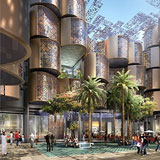Sustainability

Delmatic systems address sustainability over the complete building life-cycle including energy and operational efficiency, the reduction of waste and disposal, longevity of life, and maximising re-use.
Systems save energy and reduce carbon emissions through presence and absence detection, daylight harvesting and daylight-linked dimming, presence-related control of air-conditioning and other energy-consuming services, integrated solar shading and daylight-maximisation, as well as zoning, sub-metering and real-time energy analysis.
Open protocol technology enables network infrastructure to be shared achieving enhanced operational efficiencies through the pooling and sharing of data as well as avoiding the duplication of hardware and cabling.
To reduce waste and disposal, systems monitor individual lamp usage and generate relamping schedules which optimise lamp life and avoid premature replacement, while real-time lamp failure monitoring enables selective replacement of lamps. Equipment is designed for a long operational life, and plug-in intelligence enables new technologies to be incorporated while retaining the original hardware and installation - maximising reuse and sustainability.
To optimise ongoing efficiency, Delmatic work closely with clients to review building performance and continually re-evaluate system configuration and operating parameters.
Masdar Zero Carbon City selects sustainable Delmatic system
Overall lifetime sustainability was the deciding factor in a Delmatic system being selected for the first phase of Masdar City – one of the world’s most sustainable urban developments powered by renewable energy.
The Delmatic system considers every watt of power and maximises energy efficiency while also enhancing overall sustainability, and minimising the extent of hardware and cabling.
Click here for more information on Masdar »

